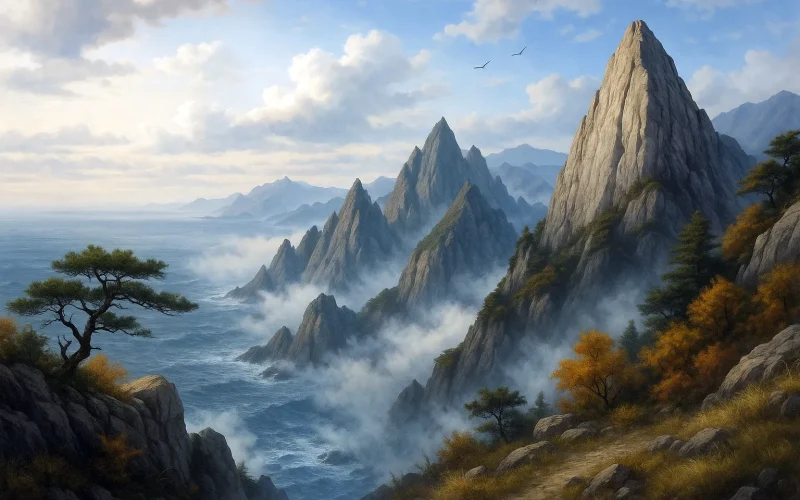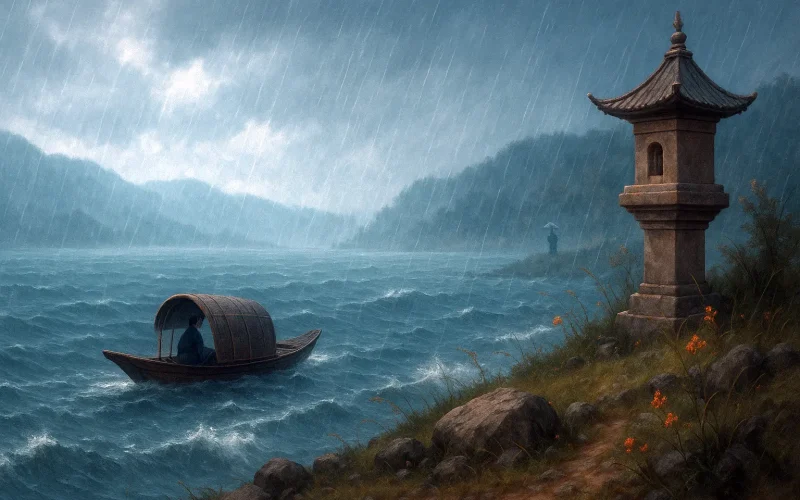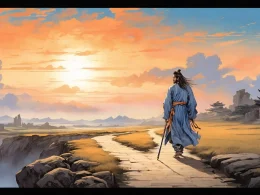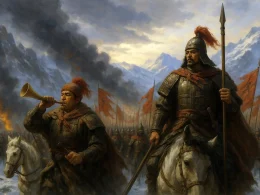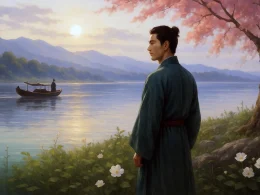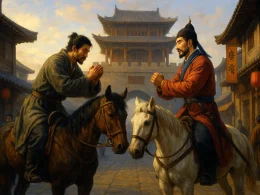The seaside rocky hills look sharp like sword or dart;
They thrust out when autumn comes to cut and break my heart.
If I could be transformed into rocks, I would stand
Atop a thousand peaks to watch for my homeland.
Original Poem:
「与浩初上人同看山寄京华亲故」
柳宗元
海畔尖山似剑铓,秋来处处割愁肠。
若为化得身千亿,散上峰头望故乡。
Interpretation:
This poem was written by Liu Zongyuan during his exile in Liuzhou, expressing his profound longing for his homeland and his resentment at being relegated. It was composed in the 12th year of the Yuanhe era (817 CE), during the poet's extended banishment to a remote region following the failure of the Yongzhen Reform. Liu uses the distinctive imagery of rugged mountains and vast landscapes to convey his emotions, reflecting his deep attachment to his country and loved ones.
First Couplet:“海畔尖山似剑铓,秋来处处割愁肠。”
(The sharp peaks by the sea resemble the edges of a sword; with autumn’s arrival, sorrow pierces the heart like a blade.)
The poet compares the pointed peaks by the sea to the sharpness of a sword, vividly depicting their steep and jagged forms. The somber mood of autumn intensifies the poet’s inner sorrow, and the imagery of sword edges cutting through the heart externalizes his deep anguish.
Second Couplet:“若为化得身千亿,散上峰头望故乡。”
(If only I could transform into a billion fragments, scattered across the mountain peaks, all gazing toward my homeland.)
Driven by an overwhelming longing for home, the poet conjures an extraordinary fantasy—splitting himself into countless parts to place them on every peak, solely to gaze toward his homeland. This imaginative expression amplifies the poet's emotions and powerfully conveys his deep yearning for home.
Stylistic Features:
- Merging Emotion with Scenery: The poet intertwines his inner sorrow with the depiction of the jagged peaks by the sea. The sharp mountains and the bleakness of autumn combine to create a desolate atmosphere, serving as a metaphor for his inner turmoil.
- Unique Imagery and Novel Metaphors: The comparison of peaks to sword edges emphasizes their sharpness and perilous nature. Meanwhile, the imaginative idea of scattering oneself across mountain peaks vividly illustrates the poet’s intense homesickness.
- Perfect Parallelism and Profound Imagery: The poem is characterized by precise parallelism and meticulous word choice. It seamlessly integrates vivid depictions of nature with authentic emotions, achieving a refined yet deeply evocative effect.
Overall Appreciation:
This poem begins with the imagery of jagged peaks by the sea, merging landscape and emotion to craft a poignant depiction of the poet’s sorrow. The first couplet vividly portrays the sharp mountains and the emotional pain they evoke. The second couplet extends this imagery, introducing a unique and fantastical vision of the poet transforming into countless fragments scattered across the peaks to gaze toward his homeland. This imaginative leap underscores his profound attachment to home and his helplessness in exile.
Inspiration:
Through vivid depictions of nature and extraordinary imagination, the poem conveys the intense longing of an exile for their homeland. It reminds us that no matter where we find ourselves, the connection to one’s home remains an indelible emotional anchor. Additionally, the poem’s reflections on exile inspire a deeper contemplation of life’s meaning: even in adversity, one can infuse life with poetry and strength through the power of emotion and imagination.
Poem translator:
Xu Yuan-chong (许渊冲)
About the poet:
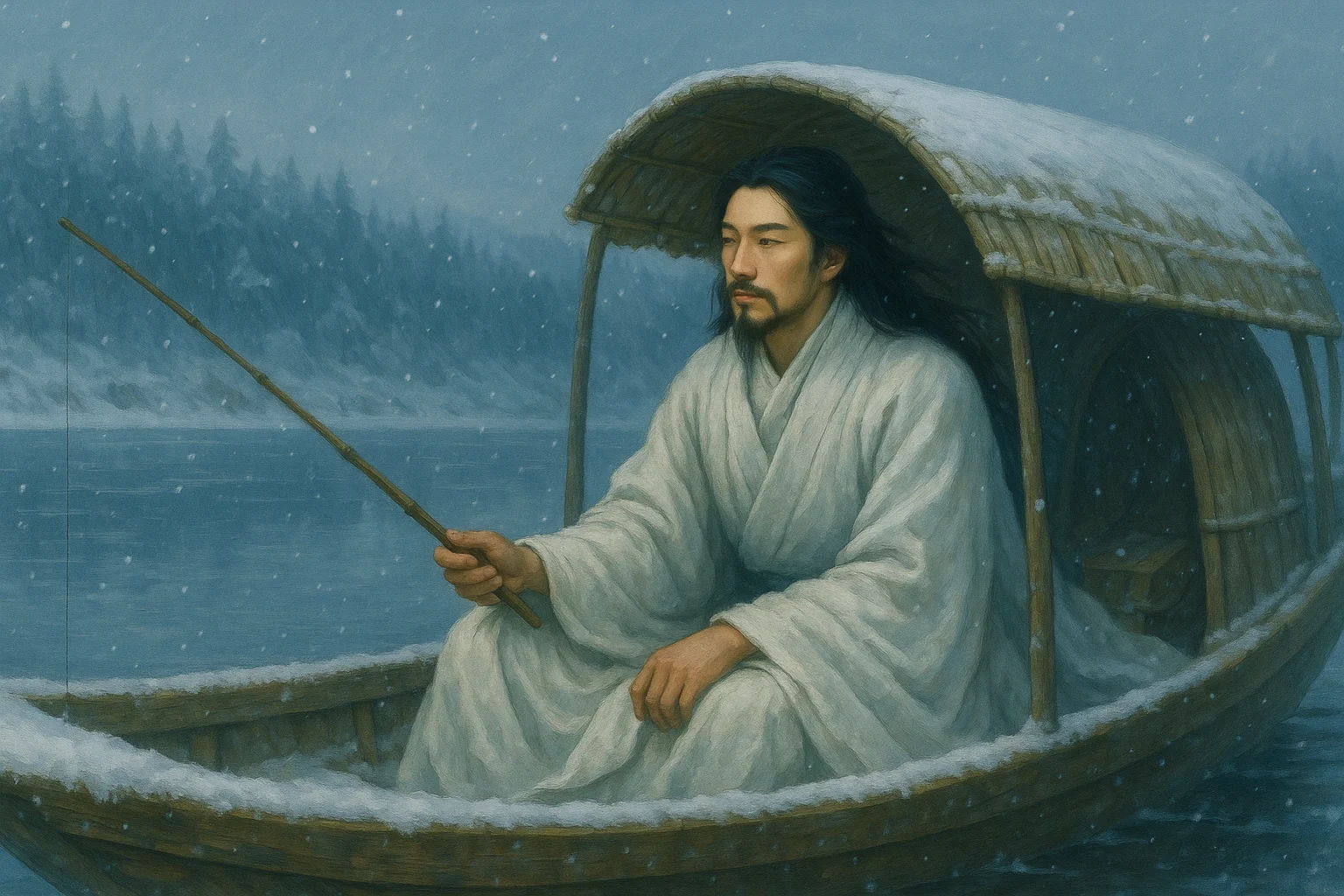
Liu Zongyuan (柳宗元), 773-819 A.D., a native of Yongji, Shanxi, was a progressive thinker, brilliant writer, and revolutionary statesman of the Tang Dynasty. Nineteen years before he was born, the An Shi Rebellion broke out, which dramatically changed the Tang Dynasty from prosperity to decline. The subsequent failure of the Yongzhen Reform was a historical tragedy that cut short Liu Zongyuan's political future, but made him one of the leading thinkers and literary figures of the Tang Dynasty.






